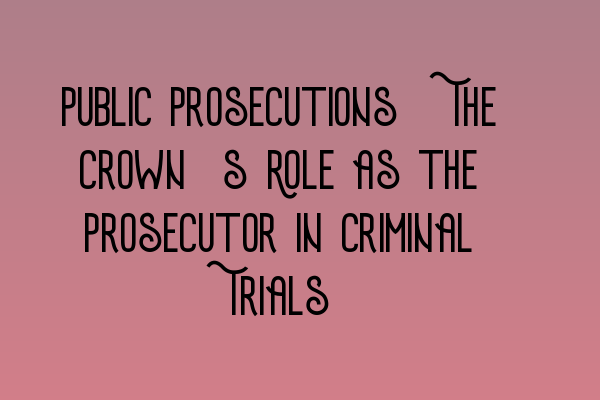Public Prosecutions: The Crown’s Role as the Prosecutor in Criminal Trials
Welcome to the SQE Criminal Law & Practice Law UK blog! In this article, we will explore the important role of the Crown as the prosecutor in criminal trials. The Crown prosecution service plays a crucial part in upholding justice and ensuring fair trials for all parties involved.
The Role of the Crown
As the primary prosecuting authority in the UK, the Crown Prosecution Service (CPS) is responsible for bringing criminal cases to court and presenting the evidence against the accused. Their role is to act as a representative of the public interest and ensure that justice is served.
When a crime is committed, the police investigate the matter and gather evidence. If they believe that there is enough evidence to support a prosecution, they will hand the case over to the CPS. The CPS will then review the evidence and make decisions on whether to prosecute, based on the Code for Crown Prosecutors.
The Code for Crown Prosecutors establishes the principles that guide the CPS in making prosecution decisions. It includes factors such as the sufficiency of evidence, the public interest, and the likelihood of a conviction. These factors help the CPS determine whether it is in the public interest to proceed with a prosecution.
Once the CPS decides to proceed with a prosecution, they become responsible for presenting the case in court. This involves preparing the necessary legal documents, such as the indictment, and coordinating with the court and other parties involved.
The Role of the Prosecutor in Court
During a criminal trial, the prosecutor represents the Crown and is responsible for presenting the evidence against the accused. Their role is to assist the court in determining the guilt or innocence of the defendant.
The prosecutor’s duties in court include examining and cross-examining witnesses, presenting physical evidence, and making legal arguments. They must present a compelling case that convinces the judge or jury of the defendant’s guilt beyond a reasonable doubt.
It is important to note that the prosecutor’s role is not to secure convictions at all costs, but rather to seek justice. They must act with integrity and fairness, ensuring that the defendant’s rights are protected throughout the trial process. The prosecutor must disclose all relevant evidence to the defense and ensure a fair and transparent trial.
Conclusion
The Crown’s role as the prosecutor in criminal trials is vital to the functioning of the justice system. The CPS acts on behalf of the public interest, making decisions on whether to prosecute based on the Code for Crown Prosecutors. In court, the prosecutor presents the evidence and makes the case against the accused, seeking justice rather than mere convictions.
For more information on the SQE Criminal Law & Practice Law UK, please check out our related articles:
- SQE 1 Practice Exam Questions
- SQE 1 Practice Mocks FLK1 FLK2
- SQE 2 Preparation Courses
- SQE 1 Preparation Courses
- SRA SQE Exam Dates
Thank you for reading and stay tuned for more informative articles!
